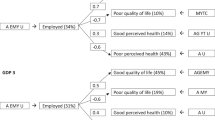Abstract
Study design:
This is a cross-sectional study.
Objectives:
The objective of this study was to examine the associations among the quality of couple relationship, perceived social support and health-related quality of life (HRQoL) in persons with spinal cord injury (SCI).
Setting:
The study was conducted in Italy.
Methods:
Forty-three persons with SCI were administered questionnaires for the evaluation of relationship quality (Dyadic Adjustment Scale), perceived social support (Multidimensional Scale of Perceived Social Support) and HRQoL (Short Form 36).
Results:
Many significant correlations between the scores of relationship quality and social support were detected. Relationship quality also correlated with relevant measures of HRQoL, such as Mental Health and Vitality. No correlation between spousal support and HRQoL was found, whereas friends’ support correlated with Physical Role Functioning.
Conclusions:
Data suggest that the perception of social support is strictly related to relationship quality and that marital satisfaction might be related to relevant aspects of HRQoL more likely than social support itself.
Similar content being viewed by others
Log in or create a free account to read this content
Gain free access to this article, as well as selected content from this journal and more on nature.com
or
References
Beedie A, Kennedy P . Quality of social support predicts hopelessness and depression post spinal cord injury. J Clin Psychol Med S 2002; 9: 227–234.
Elliott TR, Herrick SM, Patti AM, Witty TE, Godshall FJ, Spruell M . Assertiveness, social support, and psychological adjustment following spinal cord injury. Behav Res Ther 1991; 29: 485–493.
Rintala D, Young ME, Hart KA, Clearman RR, Fuhrer MJ . Social support and the well-being of persons with spinal cord injury living in the community. Rehabil Psychol 1992; 37: 155–163.
Müller R, Peter C, Cieza A, Geyh S . The role of social support and social skills in people with spinal cord injury: A systematic review of the literature. Spinal Cord 2012; 50: 94–106.
Revenson TA, Schiaffino KM, Majerovitz SD, Gibofsky A . Social support as a double-edged sword: The relation of positive and problematic support to depression among rheumatoid arthritis patients. Soc Sci Med 1991; 33: 807–813.
Fiske V, Coyne JC, Smith DA . Couples coping with myocardial infarction: An empirical reconsideration of the role of overprotectiveness. J Fam Psychol 1991; 5: 4–20.
Kiecolt-Glaser JK, Newton TL . Marriage and health: His and hers. Psychol Bull 2001; 127: 472–503.
Coyne JC, DeLongis A . Going beyond social support: the role of social relationships in adaptation. J Consult Clin Psychol 1986; 54: 454–460.
Rook K . Detrimental aspects of social relationships: Taking stock of an emerging literature. In: Veil O, Baumann U (eds). The Meaning and Measurement of Social Support. Hemisphere: New York, pp 157–170 1992.
Pierce GR, Sarason IG, Sarason BR . General and relationship-based perceptions of social support: Are two constructs better than one? J Pers Soc Psychol 1991; 61: 1028–1039.
Holicky R, Charlifue S . Ageing with spinal cord injury: The impact of spousal support. Disabil Rehabil 1999; 21: 250–257.
DeVivo MJ, Hawkins LN, Richards JS, Go BK . Outcomes of post-spinal cord injury marriages. Arch Phys Med Rehabil 1995; 76: 130–138.
Post MW, van Leeuwen CM . Psychosocial issues in spinal cord injury: A review. Spinal Cord 2012; 50: 382–389.
Alexander CJ, Hwang K, Sipski ML . Mothers with spinal cord injuries: Impact on marital, family, and children’s adjustment. Arch Phys Med Rehabil 2002; 83: 24–30.
Chan RC, Lee PW, Lieh-Mak F . Coping with spinal cord injury: Personal and marital adjustment in the Hong Kong Chinese setting. Spinal Cord 2000; 38: 687–696.
Peters LC, Stambrook M, Moore AD, Zubek E, Dubo H, Blumenschein S . Differential effects of spinal cord injury and head injury on marital adjustment. Brain Inj 1992; 6: 461–467.
Yim SY, Lee IY, Yoon SH, Song MS, Rah EW, Moon HW . Quality of marital life in Korean spinal cord injured patients. Spinal Cord 1998; 36: 826–831.
Frazier PA, Tix AP, Barnett CL . The relational context of social support: Relationship satisfaction moderates the relations between enacted support and distress. Pers Soc Psychol Bull 2003; 29: 1133–1146.
Rolland JS . In sickness and in health: The impact of illness on couples’ relationships. J Marital Fam Ther 1994; 20: 327–347.
Spanier GB . The measurement of marital quality. J Sex Marital Ther 1976; 5: 288–300.
Zimet GD, Powell SS, Farley GK, Werkman S, Berkoff KA . Psychometric characteristics of the Multidimensional Scale of Perceived Social Support. J Pers Assess 1990; 55: 610–617.
Ware JE, Sherbourne CD . The MOS 36-Item Short-Form Health Survey (SF-36): I. conceptual framework and item selection. Med Care 1992; 30: 473–483.
Itzkovich M, Gelernter I, Biering-Sorensen F, Weeks C, Laramee MT, Craven BC et al. The Spinal Cord Independence Measure (SCIM) version III: reliability and validity in a multi-center international study. Disabil Rehabil 2007; 29: 1926–1933.
Gentili P, Contreras L, Cassaniti M, D’Arista F . La Dyadic Adjustment Scale. Una misura dell’adattamento di coppia. Minerva Psichiatr 2002; 43: 107–116.
Carstensen LL, Isaacowitz DM, Charles ST . Taking time seriously: A theory of socioemotional selectivity. Am Psychol 1999; 54: 165–181.
Jensen MP, Smith AE, Bombardier CH, Yorkston KM, Mirò J, Molton IR . Social support, depression, and physical disability: age and diagnostic group effects. Disabil Health J 2014; 7: 164–172.
Cutrona CE, Russell DW, Gardner KA . The relationship enhancement model of social support. In: Revenson TA, Kayser K, Bodenmann G (eds). Couples Coping with Stress. Emerging Perspectives on Dyadic Coping. American Psychological Association: Washington, DC, pp 73–95.
Rolland JS . Families, Illness and Disability. An Integrative Treatment Model. Basic Books: New York. 1994.
DeVivo MJ, Biering-Sørensen F, New P, Chen Y . International Spinal Cord Injury Data Set. Standardization of data analysis and reporting of results from the International Spinal Cord Injury Core Data Set. Spinal Cord 2011; 49: 596–599.
Author information
Authors and Affiliations
Corresponding author
Ethics declarations
Competing interests
The authors declare no conflict of interest.
Rights and permissions
About this article
Cite this article
Tramonti, F., Gerini, A. & Stampacchia, G. Relationship quality and perceived social support in persons with spinal cord injury. Spinal Cord 53, 120–124 (2015). https://doi.org/10.1038/sc.2014.229
Received:
Revised:
Accepted:
Published:
Issue date:
DOI: https://doi.org/10.1038/sc.2014.229
This article is cited by
-
Predictors of partnership and sexual satisfaction and dyadic effects in couples affected by endometriosis and infertility
Archives of Gynecology and Obstetrics (2024)
-
Australian arm of the International Spinal Cord Injury (Aus-InSCI) Community Survey: 3. Drivers of quality of life in people with spinal cord injury
Spinal Cord (2023)
-
Social support and its association with depression, gender and socioeconomic indicators in individuals with spinal cord injury in Iran
Spinal Cord (2017)



